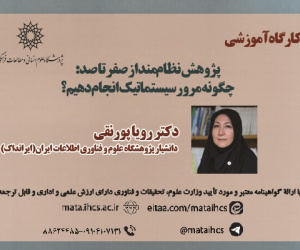مقایسه اثر میانجی گری حمایت های مالی دولتی و غیردولتی بر عملکرد شرکت های دانش بنیان فاوا (مقاله علمی وزارت علوم)
درجه علمی: نشریه علمی (وزارت علوم)
آرشیو
چکیده
اقتصاد دانش بنیان به عنوان موتور توسعه کشورها شناخته می شود و به همین دلیل کشورها برای ربودن گوی سبقت در حوزه فناوری های پیشرفته سال هاست دست به سرمایه گذاری در حوزه فناوری های پیشرفته و نوآوری های نوظهور زده اند. ایران نیز چاره برون رفت از رکود اقتصادی طولانی مدت سال های تحریم را توسعه اقتصاد دانش بنیان دانسته است. هدف این مقاله، تحلیل و بررسی اثر میانجی گری حمایت های مالی دولتی و غیردولتی بر عملکرد شرکت های دانش بنیان در حوزه فناوری اطلاعات و ارتباطات (فاوا) می باشد. پژوهش حاضر از نظر داده و روش تحقیق کمی می باشد که به صورت طولی انجام شده است. داده های لازم برای آزمون 10 فرضیه در این پژوهش از صندوق نوآوری و شکوفایی و معاونت علمی ریاست جمهوری دریافت و مورد تحلیل قرار گرفته است. از نظر قلمرو مکانی، شرکت های دانش بنیان حوزه فاوا در نمونه این پژوهش مورد بررسی قرار گرفته که شامل 1002 شرکت از مجموع 1667 شرکت دانش بنیان حوزه فاوا است که از ابتدای قانون حمایت از شرکت های دانش بنیان (1389) تا پایان شهریورماه 1401 موفق به اخذ عنوان دانش بنیانی روی حداقل یکی از محصولات (کالا یا خدمات) خود شده اند. برای آزمون فرضیه ها از روش رگرسیون خطی و نرم افزار وارپ پی ال اس نسخه 8 استفاده شده است. نتایج تحلیل نشان می دهد باوجود تلاش های صورت گرفته در حمایت مالی از شرکت های دانش بنیان در تجاری سازی و توانمندسازی، این حمایت ها تأثیر معنی داری بر عملکرد شرکت ها نداشته و عملکرد شرکت ها اغلب بر اساس نظریه منبع محور به منابع داخلی سازمان همچون منابع مالی و نیروی انسانی شرکت بستگی دارد. لذا این پژوهش فقدان کارایی حمایت های مالی از شرکت ها برای ایجاد عملکرد را گوشزد می کند و آن را سیاستی منجر به هدررفت منابع می داند.Comparing the mediating effect of governmental and non-governmental support on the performance of knowledge-based companies in the field of ICT
The knowledge-based economy is known as the engine of countries' development, For this reason, many countries have been investing in advanced technologies such as biotechnology, Internet of Things, industrial data, blockchain, artificial intelligence and etc. as well as emerging innovations for many years for technological excellence. Iran is not an exception to this policy and has considered the development of a knowledge-based economy as the way out of the long-term economic stagnation of the years of sanctions. The purpose of this article is to analyze and investigate the mediating effect of government and non-government financial support on the performance of knowledge-based companies in the field of ICT The present research is quantitative in terms of data and research method. The necessary data for the test of 6 hypotheses in this research were received and analyzed from the Innovation and Prosperity Fund and the Scientific Vice President. The knowledge-based companies in the sample of this research include 1002 companies out of a total of 1667 knowledge-based companies that have managed to obtain a knowledge-based title on at least one of their products (goods or services) by the end of September 1401. Linear regression method and Warp PLS 8 software were used to test the hypotheses. The results of this research show that despite the efforts made to support knowledge-based companies, these supports have not had a significant effect on the performance of companies, and the performance of companies is often based on the resource-oriented theory of the organization's internal resources.






